The program "Teacher for Russia." In the hope of improving the Russian school education
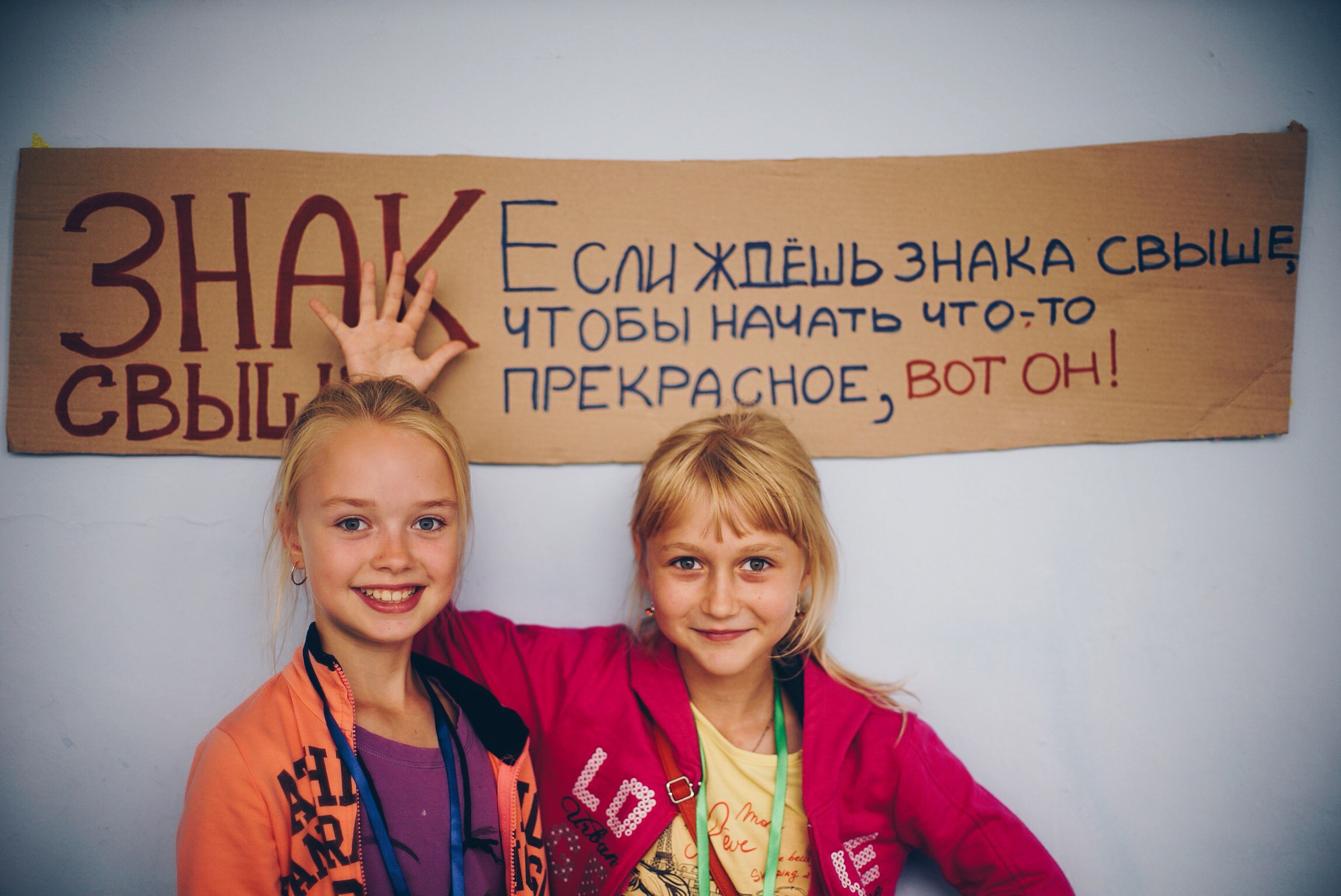
Thursday 8 October at 15:00, classmate, friend, and head (from which I publish this post) was brought before me, a historian, the task to write an article for Habrahabr on why Abrollsoftware needs (!) to go to work in the school, to meet reasonable, good and eternal. And so that article does not look advertising (person?), and another with statistics that more digits and reliance on science. In General, the problem had involved nearly the entire Arsenal of stereotypes about those who lives here. However, to tell here need.
We are in the project "Teacher for Russia", which started this year, I want to attract to work in school for the most talented, the best of the best. Even Yandex agrees with us and invites one of the presentations of our project to carry out. ... Also famous for its audience, and we came here looking for.
So. We recruit teachers to schools. It would seem, the same now occupied by the Russian state, but as you no doubt know, there are nuances.
Who works in the school system today?
According to the Committee in the 2014-2015 academic year in the schools operated 1052 thousand teachers.
81% were women.
84% education.
The average age – 52 years, despite the fact that the average age of Russian 39,4.
With an average salary of 17000-20000 per month (with the exception of Moscow). And it is based on the experience of more experienced teachers and after calculation of all allowances.
This means that with all due respect to the people performing one of the most important tasks for the survival and existence of our society, the school for little money working elderly women.
"it has always been So" (actually, no). Why is that bad?
Our colleagues from "Detention" wrote here about how "digital immigrants" (teachers) teach "digital natives" (present students). That is, in one class during one lesson at the same time there are people from different worlds. Often this leads to the fact that students and teachers have different, but similar goal – to survive (to relive the moment of communion). The achievement of this goal, however, is not conducive to the implementation of the main tasks of the education system, that is most education.
According to the International program for the assessment of educational achievements of students (Programme for International Student Assessment / PISA), Russia in 2012 was on 34 among 65 States on the level of mathematical literacy. Here is a more than eloquent picture:
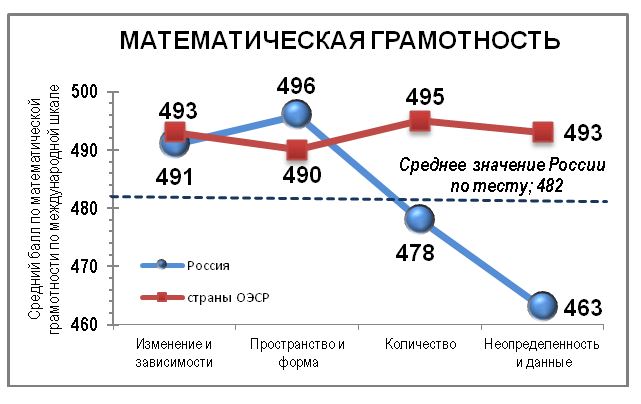
The USSR was the most reading country in the world. At least, so said Soviet propaganda. And that in Russia? According to the same PISA the level of reading literacy of our students is even lower – 37 place from 65. And judging by the next image, they are able to search for information, but sometimes find it difficult to evaluate and was found to apply in practice. That is reading for reading. Search for search. Exciting, but not about the development.
This, incidentally, is associated with the traditional school question: "geometry/ algebra/ history/ geography will be useful in life?" With the current approach in any way. That is, within the school of education students are actually used to evaluate obtained information, not to look for practical significance and to learn.
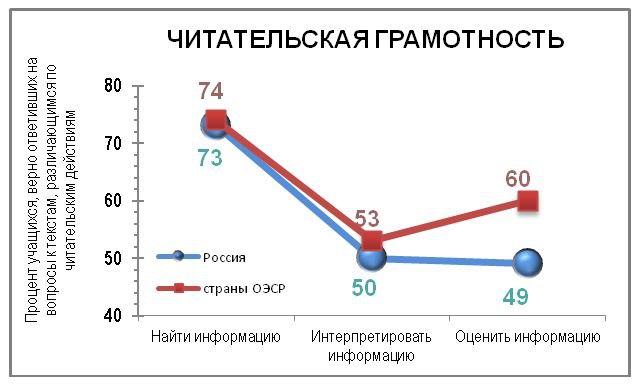
Source: Information and coordination centre for cooperation with the Organization for economic cooperation and development
Not the best way things are and with the natural Sciences. S. Berdonosov, doctor of chemical Sciences and teacher of high school №171 (Moscow) writes in his article about the crisis of school chemical education:
"it is clear that for Russia's successful development in the coming decades it is vital to ensure a high level of teaching chemistry at school and to engage in research and production activities of the well-prepared high school graduates".Source: "First of September".
And it is necessary to remind that the teachers, most of them middle-aged women with rich, but the prevailing experience of communication with students, and hence their techniques, including educational work, almost do not change.
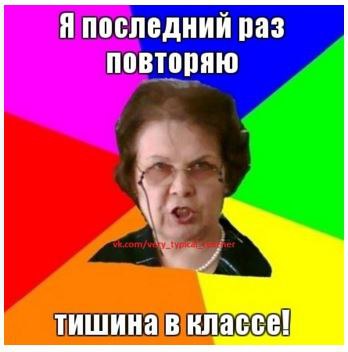
Source: group VKontakte "Typical teacher"
Thus, the current education system, one of the key components of which is the teaching staff often do not understand their students, slowly but surely reduces the level of knowledge, abilities and skills of students in all areas, which in turn affects the life of the whole country, etc. etc. etc.
But what about teaching?
Educational institutions are wonderful. For example, Moscow state pedagogical University or the Russian State pedagogical University. A. I. Herzen in Saint-Petersburg. But overall, the picture is sad. As a rule, these universities receive a weak high school graduates, only 5% of them really want to work in the school. And only 20% graduates from these universities come to the school. In General, while educational institutions do not help to solve the problem of rejuvenation of teaching staff.
What offer?
In 1863, N. Chernyshevsky wrote a book, the title of which took one of the eternal Russian questions: "What?". The Russian authorities have also tried to answer the question regarding the development of the school system. The state program "educational Development" 2013 – 2020 years among the "fundamental changes" that must occur 2020 named:
the
-
the
- "a qualitative change in the content and methods of teaching with emphasis on the development of interest and activity of students, formation of complete system of profile training on the basis of individual learning plans, advanced update programs, learning math, technology, foreign languages, social Sciences...; the
- rejuvenate and increase the professional level of teaching personnel...; the
- a significant increase in the scale and resource efficiency of informal (outside the organizations of additional education of children) and informal education (mass media, Internet)".
What do we do?
How effective will a government program, we can only judge in 2020, when the period for which it is designed, will come to an end. However, in the project "Teacher for Russia" we are asked a question, what can I do, that these "fundamental changes" have occurred.
To solve this problem, we turned to international experience in project Teach for all, which experience formed the basis of his Russian localization. Similar projects exist in 36 countries: UK, Germany, Sweden, Australia, India, China etc. To include more 15 thousand teachers around the world.
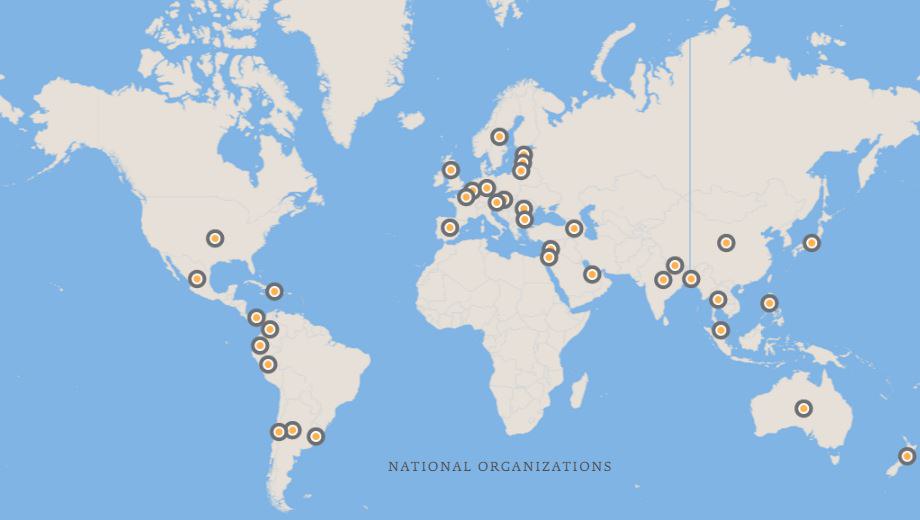
Source: Teach for All
For example, in Britain statistics passing GSCV (British equivalent exam) in the schools where I went to work the participants of the project (on the Islands it is called Teach First), relative to other schools (0% on the graph) has improved significantly.
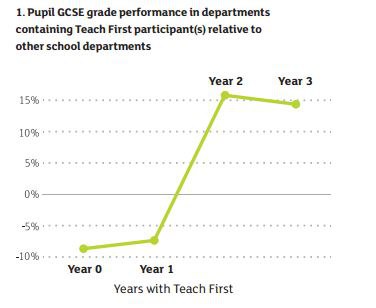
Source: Teach First
According to research by the U.S. Department of education, math teacher, came to U.S. schools in the framework of such a program (Teach for America), proved to be more effective than their colleagues.
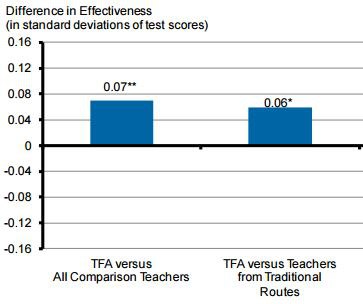
Source: Teach for All
There, in the United States, 50% participants in the program after its completion continue to work in schools. Moreover, they themselves opened the 800 schools throughout the country.
But statistics from other parts of the world. India.
the
98% of Directors of Indian schools participating in the program Teach for India, consider that in the framework of innovative methods of conducting lessons more interesting for students than traditional methods.
92% of the same Directors recommended methods participants of our program to other teachers.
How does it work?
1. selecting the best graduates for schools participating in the program. If you send random people in random places can get a completely random result. That is why we conduct a four-step selection process all participants of the project, offering to fill in a questionnaire, undergo a skype interview and participate in the assessment Center. The last stage of selection – Summer Institute. The training is a direct training to enter into school practice. According to his result, and we, members finally make a decision about the readiness to go to the children as teachers from 1 September.
Thus, we select those who want to make schooling better prepared to put your knowledge and skills, to develop skills. It does not matter whether the participants of the program of teacher education. For us important is the personal interest of each, the ability of unconventional thinking, willingness to take responsibility for their words and actions.
Last year our program received 489 applications, after the first two stages of the selection process is left 98. To work in school of Moscow, Voronezh, Moscow and Voronezh oblasts went 42 teachers.
That's what they say:
2. Intensive teacher training. We do not send young teachers to the children is not prepared, in order not to injure in the first place the children themselves.
Such training begins in the summer at the Summer Institute where the future teachers within 5 weeks, sometimes 12 hours a day undergo intense training from the best teachers in the country, coaches, professionals in education, receiving a large amount of theoretical and primarily practical, knowledge.
Now it is accepted to repeat that education should be continuous. This also applies to teachers. Our members throughout their participation in trainings, participate in workshops and never cease to improve. In addition, they work with a coach not related to education directly, and also with the teacher, who is a specialist in their subject.
3. We expect that in two years, for the duration of the program will occur the professional development of our teachers. Teachers from the first set began their work in schools September 1, 2015, so this item is still our expectation. We do everything we can to make the plans come true. In the second year, program participants will develop their own social project with the possibility of obtaining a grant for its implementation.
Based on this technique we went ahead. Our partners are "Sberbank of Russia", "Higher school of Economics", Yandex, about which wrote above.
do we Believe that we will succeed?
Believe. Understanding of the situation in which the education system in our country and the path that passed the country in the framework of Teach for All, engenders not just faith, but confidence in the correctness of what we do.
All this allows us not only to introduce in the school of modern educational methods and technologies and create a different image of a successful teacher. Sending young teachers in the first place in the regional schools, we aim to solve the problem of unequal access to quality education. Already repeatedly mentioned above, the PISA study clearly indicates that the level of teaching in schools, cities and all other schools of Russia is fundamentally different.
Change is important to us. And I hope that for you too.
Alexey Stolyarov
Комментарии
Отправить комментарий